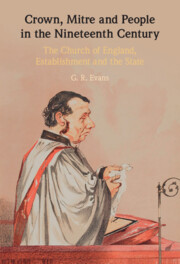 Crown, Mitre and People in the Nineteenth Century
Crown, Mitre and People in the Nineteenth Century Published online by Cambridge University Press: 14 September 2021
Ecclesiastical courts were rightly seen by nineteenth-century thinkers as a closed shop, a court system separate from the general court system which had its own proctors, advocates and judges. These courts had jurisdiction over the laity in a number of matters such as marriage, burial and probate of wills, though this changed during the century. The chapter describes the attempts at reform, and the difficulties with discipline of the laity as well as clergy that were addressed in the course of legislative change. Appeal lay with the secular courts and here too lay problems, where the Judicial Committee of the Privy Council served as the final court of appeal
To save this book to your Kindle, first ensure no-reply@cambridge.org is added to your Approved Personal Document E-mail List under your Personal Document Settings on the Manage Your Content and Devices page of your Amazon account. Then enter the ‘name’ part of your Kindle email address below. Find out more about saving to your Kindle.
Note you can select to save to either the @free.kindle.com or @kindle.com variations. ‘@free.kindle.com’ emails are free but can only be saved to your device when it is connected to wi-fi. ‘@kindle.com’ emails can be delivered even when you are not connected to wi-fi, but note that service fees apply.
Find out more about the Kindle Personal Document Service.
To save content items to your account, please confirm that you agree to abide by our usage policies. If this is the first time you use this feature, you will be asked to authorise Cambridge Core to connect with your account. Find out more about saving content to Dropbox.
To save content items to your account, please confirm that you agree to abide by our usage policies. If this is the first time you use this feature, you will be asked to authorise Cambridge Core to connect with your account. Find out more about saving content to Google Drive.